Input interpretation

1, 1, 1, 3, 3, 3-hexafluoro-2-propan(ol-d)
Chemical names and formulas
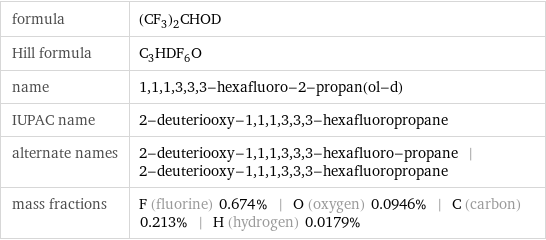
formula | (CF_3)_2CHOD Hill formula | C_3HDF_6O name | 1, 1, 1, 3, 3, 3-hexafluoro-2-propan(ol-d) IUPAC name | 2-deuteriooxy-1, 1, 1, 3, 3, 3-hexafluoropropane alternate names | 2-deuteriooxy-1, 1, 1, 3, 3, 3-hexafluoro-propane | 2-deuteriooxy-1, 1, 1, 3, 3, 3-hexafluoropropane mass fractions | F (fluorine) 0.674% | O (oxygen) 0.0946% | C (carbon) 0.213% | H (hydrogen) 0.0179%
Lewis structure
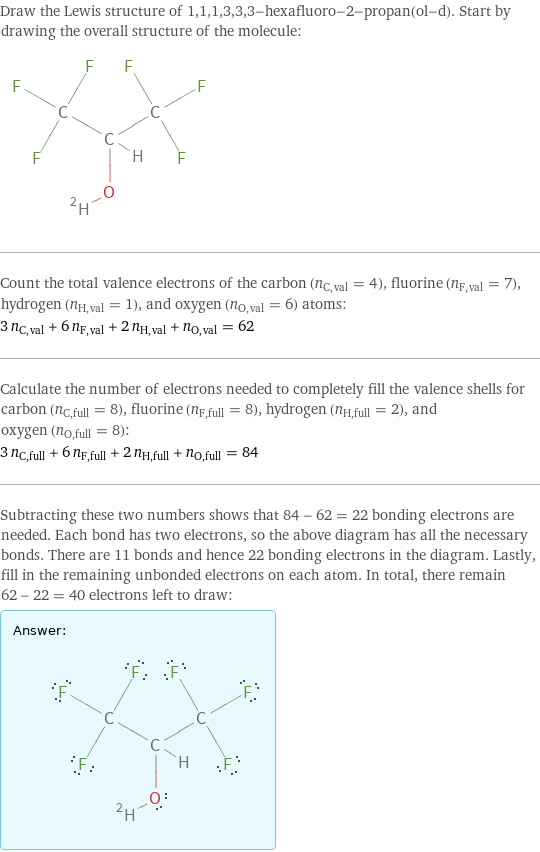
Draw the Lewis structure of 1, 1, 1, 3, 3, 3-hexafluoro-2-propan(ol-d). Start by drawing the overall structure of the molecule: Count the total valence electrons of the carbon (n_C, val = 4), fluorine (n_F, val = 7), hydrogen (n_H, val = 1), and oxygen (n_O, val = 6) atoms: 3 n_C, val + 6 n_F, val + 2 n_H, val + n_O, val = 62 Calculate the number of electrons needed to completely fill the valence shells for carbon (n_C, full = 8), fluorine (n_F, full = 8), hydrogen (n_H, full = 2), and oxygen (n_O, full = 8): 3 n_C, full + 6 n_F, full + 2 n_H, full + n_O, full = 84 Subtracting these two numbers shows that 84 - 62 = 22 bonding electrons are needed. Each bond has two electrons, so the above diagram has all the necessary bonds. There are 11 bonds and hence 22 bonding electrons in the diagram. Lastly, fill in the remaining unbonded electrons on each atom. In total, there remain 62 - 22 = 40 electrons left to draw: Answer: | |
3D structure
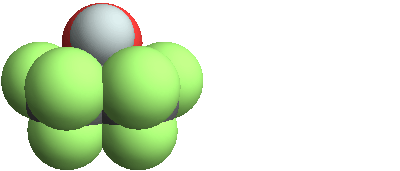
3D structure
Basic properties
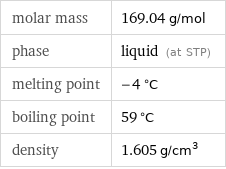
molar mass | 169.04 g/mol phase | liquid (at STP) melting point | -4 °C boiling point | 59 °C density | 1.605 g/cm^3
Units

Liquid properties (at STP)

density | 1.605 g/cm^3 refractive index | 1.3
Units

Non-standard atom properties

H-2 | 1
Chemical identifiers
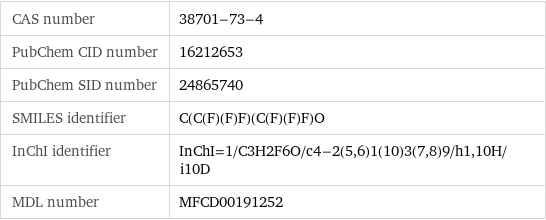
CAS number | 38701-73-4 PubChem CID number | 16212653 PubChem SID number | 24865740 SMILES identifier | C(C(F)(F)F)(C(F)(F)F)O InChI identifier | InChI=1/C3H2F6O/c4-2(5, 6)1(10)3(7, 8)9/h1, 10H/i10D MDL number | MFCD00191252